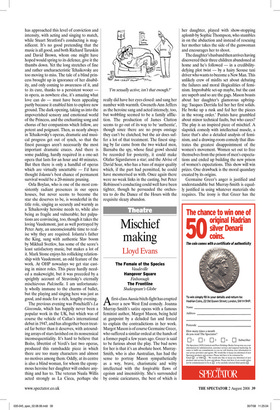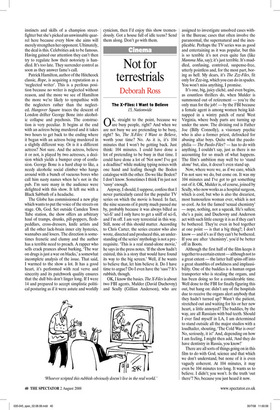Mischief making
Lloyd Evans
The Female of the Species Vaudeville Hangover Square Finborough The Frontline Shakespeare’s Globe
Afirst-class Aussie bitch-fight has erupted over a new West End comedy. Joanna Murray-Smith’s satire opens with a famous feminist author, Margot Mason, being held at gunpoint by a deluded fan and forced to explain the contradictions in her work. Margot Mason is of course Germaine Greer, who suffered a similar ordeal at the hands of a former pupil a few years ago. Greer is said to be furious about the play. The bad news for her is that it’s an absolute hoot. MurraySmith, who is also Australian, has had the sense to portray Mason sympathetically as a wry, brave, charismatic and witty intellectual with the forgivable flaws of egoism and insensitivity. She’s surrounded by comic caricatures, the best of which is her daughter, played with show-stopping aplomb by Sophie Thompson, who stumbles in on the abduction and instead of rescuing her mother takes the side of the gunwoman and encourages her to shoot.
The daughter’s husband then arrives having discovered their three children abandoned at home and he’s followed — in a credibilitydefying plot twist — by a hairy Scouse taxi driver who wants to become a New Man. This unlikely crew of misfits set about debating the failures and moral illogicalities of feminism. Improbable set-up maybe, but the cast are superb and so are the gags. Mason boasts about her daughter’s glamorous upbringing: ‘Jacques Derrida fed her her first solids. He broke up a rusk and fed her the pieces in the wrong order.’ Purists have grumbled about minor technical faults, but who cares? The play is an inspired piece of mischief. A slapstick comedy with intellectual muscle, a farce that’s also a detailed analysis of feminism, and a drawing-room comedy that illustrates the greatest disappointment of the women’s movement. Women set out to free themselves from the prison of men’s expectations and ended up building the new prison of women’s expectations. This show will win prizes. One drawback is the moral quandary created by its origins.
Germaine Greer’s anger is justified and understandable but Murray-Smith is equally justified in using whatever materials she requires. The irony is that Greer has the instincts and skills of a champion streetfighter but she’s picked an unwinnable quarrel here because every blow she aims will merely strengthen her opponent. Ultimately, the deal is this. Celebrities ask to be famous. Having gained our attention they can’t then try to regulate how their notoriety is handled. It’s too late. They surrender control as soon as they answer fame’s call.
Patrick Hamilton, author of the Hitchcock classic, Rope, is acquiring a reputation as a ‘neglected writer’. This is a perilous position because no writer is neglected without reason, and the more we see of Hamilton the more we’re likely to sympathise with the neglecters rather than the neglected. Hangover Square traces the descent of London drifter George Bone into alcoholic collapse and psychosis. The construction is very peculiar. It begins at the end with an actress being murdered and it takes two hours to get back to the ending where it began with an actress being murdered in a slightly different way. Or is it a different actress? Not sure. And the actress, believe it or not, is played by two actresses, a decision which yields a bumper crop of confusion. George Bone is a hard chap to like, a needy alcoholic social climber who hangs around with a bunch of vacuous bores who call him nasty names when he’s not in the pub. I’m sure many in the audience were delighted with this show. It left me with a Black Sabbath of a headache.
The Globe has commissioned a new play which wants to put the voice of the streets on stage. Oh, God. Set outside Camden Town Tube station, the show offers an arbitrary haul of tramps, drunks, pill-poppers, fleshpeddlars, cross-dressers, knife artists and all the other lack-brain inner city hysterics, wannabes and losers. The direction is sometimes frenetic and clumsy and the author has a terrible need to preach. A rapper who sells crack prances about barking, ‘The war on drugs is just a war on blacks,’ a somewhat incomplete analysis of the issue. That said, I warmed to the show a lot. It has a good heart, it’s performed with real verve and sincerity and its patchwork quality ensures that the dull bits don’t linger long. If I were 14 and prepared to accept simplistic political posturing as if it were astute and worldly cynicism, then I’d enjoy this show tremendously. Got a house full of idle teens? Send them along. Don’t go with them.



























































 Previous page
Previous page